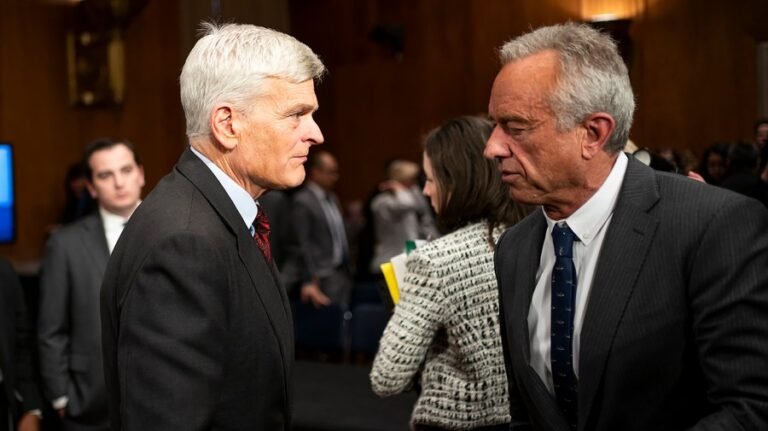
Speaker Mike Johnson (R-La.) on Monday came out against a bipartisan war powers resolution to prevent U.S. intervention in Iran, a show of support for President Trump as dozens of lawmakers question the weekend strikes on Iranian nuclear facilities.
Reps. Thomas Massie (R-Ky.) and Ro Khanna (D-Calif.), a libertarian and progressive pair, introduced a war powers resolution last week that would direct Trump to “terminate the use” of U.S. armed forces from Iran unless Congress authorizes such involvement. Massie said Monday the effort has 57 cosponsors, and he vowed to bring a vote on the legislation.
Asked Monday if he would allow the bipartisan measure to come to the floor for a vote, Johnson demurred, suggesting it was a political endeavor, and noted presidents in both parties had authorized military strikes without congressional approval.
“I don’t think this is an appropriate time for a war powers resolution, and I don’t think it’s necessary,” the Speaker told reporters in the Capitol. “For 80 years, presidents of both parties have acted with the same commander in chief authority under Article 2. You had President Biden used three times in Middle East operations. President Obama went on an eight-month campaign of bombing Libya to take down the regime there.”
“I never heard a Democrat balk about any of that, and suddenly, now, they’re just up in arms,” he added. “It’s all politics. This is not a time for politics.”
Despite Johnson’s opposition, Massie and Khanna can still force their measure to the floor. The resolution is privileged and can be called up for debate and a vote after 15 days of no committee action. The duo introduced the legislation June 17.
The pair has not signaled its plans, but Monday, Massie said the resolution would come up for a vote.
“Whether you like it or not Congress will be voting on U.S. hostilities in Iran,” he wrote on the social platform X. “Under the War Powers Act, the President is required to withdraw from hostilities in Iran within 60 days (+30 day ext.) unless he gets a vote of Congress.”
Talk about the war powers resolution is ramping up after the U.S. struck three nuclear facilities in Iran on Saturday, escalating the situation in the Middle East. Tehran retaliated Monday, launching an attack on the Al Udeid U.S. Air Force base in Qatar, an offensive that was thwarted by Qatari air defenses.
Reaction to the weekend’s U.S. strike on Iran largely broke along party lines, with Democrats criticizing Trump’s decision to launch an attack on Iran — without authorization from Congress — and Republicans cheering on the move as decisive in setting back Tehran’s nuclear program, and within the president’s authority as commander in chief.
There were, however, some outliers, including Massie, who had pushed against U.S. intervention in Iran and wrote on X shortly after news of the strike broke: “This is not Constitutional.”
Scores of other Democrats also dubbed the weekend strike as unconstitutional, and at least two — Reps. Alexandria Ocasio-Cortez (D-N.Y.) and Sean Casten (D-Ill.) — went a step further, saying the attack is grounds for impeachment, a notion Johnson said was “absolute nonsense.”
The Speaker backed Trump on Monday, telling reporters, “The president made an evaluation that the danger was imminent enough to take his authority as commander in chief.” He noted that he received a classified briefing on the situation early Monday morning.
“The commander in chief has Article 2 responsibilities. They’re very serious and important, especially in times like this,” Johnson said. “I think he used that authority judiciously. I think he, this commander in chief, means what he says, says what he means, and he’s trying to protect American assets and personnel.”
Asked if the U.S. should respond to Iran’s retaliation, Johnson said “it’s up to the commander in chief.”
“He sent a very clear message that they should not,” the Speaker added. “He wanted Iran to come back to the negotiating table in good faith. The problem is they weren’t there in the first place.”





